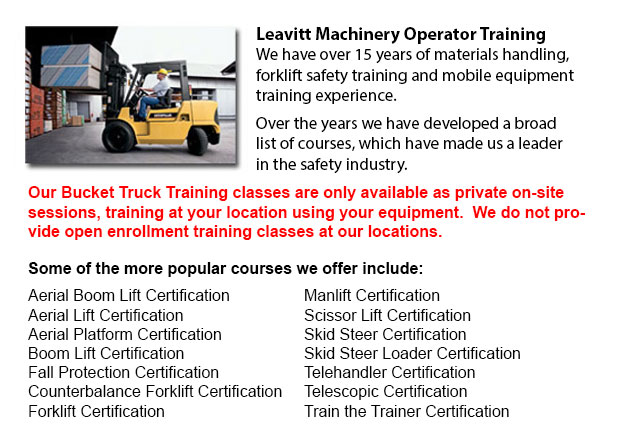
Bucket Truck Training Kelowna - The bucket truck training program is a program which is designed to effectively train qualified operators so they can lessen the possibility of personal injury and incident while working with or in close proximity to bucket trucks or likewise referred to as vehicle-mounted aerial work platform. An aerial lift device refers to whichever vehicle-mounted device, telescoping or articulating, or both, which is made use of to position employees to reach spots that will otherwise be not accessible. Aerial lift devices are utilized in order to elevate employees to above-ground work sites.
The program aims to provide operators with the skills, knowledge, abilities, and training materials required in order to efficiently and safely operate vehicle-mounted aerial work platforms.
The program consists of a hands-on training session and a classroom training session. To become certified, participants must be successful in both components. A full-size certificate and a wallet-size certificate will be given upon completion of the program.
The kinds of lifts examined in the program comprise Aerial lift devices are often constructed with metal, wood, fiberglass, reinforced plastic or other materials.
Definitions
Articulating boom platform: has at least 2 hinged boom parts.
Extensible boom platform: has either a telescopic boom or an extensible boom.
Platform: the component of an aerial device which is designed to carry employees.
Mobile unit: any aerial device together with its components like vehicle and related machine.
Workers who work with aerial devices have the responsibility of ensuring that they are properly authorized and trained. Workers should make sure that people who are not authorized and trained do not make use of lift devices. Workers must make sure that they wear the correct protective equipment if working from the platform.
The course content utilized in the bucket truck training program comprises the operation of the vehicle-mounted aerial work platform, pre-shift inspections, safe operating practices, lifting capacity, use of emergency controls, and administering theory and practical tests. Operators would learn legal requirements under the local and federal regulations.
-
Counterbalance Forklift License Kelowna
Counterbalance Forklift License Kelowna - Forklifts, when operated by completely trained workers, are a major advantage to companies. We offer a thorough training program consisting of all parts of operating a powered lift device. Counterbalance fork... More -
Forklift Certification Schools Kelowna
Forklift Certification Schools Kelowna - Within North America, forklift certification is mandatory, making forklift training programs important for both the company and their employees working as forklift operators. Forklift training focuses on healt... More -
Manlift Operator Certification Kelowna
Manlift Operator Certification Kelowna - We provide a scissor platform and aerial lift training and certification to empower the trainee with the general understanding and knowledge of the safe and efficient utilization of "Power Operated Mobile Work... More -
Crane Training Schools Kelowna
Crane Training Schools Kelowna - We have designed several programs for Mobile Crane Operation at our Crane Training Schools. These programs are recommended for the experienced operator who requires re-certification or certification, and for inexperie... More -
Heavy Equipment Operator Classes Kelowna
Heavy Equipment Operator Classes Kelowna - A heavy equipment operator is a person who has received the proper training to operate a particular type or piece of machine. There are a lot of ways for the operator to undergo training and certification in... More -
Telehandler, Rotational Telehandler, Zoom Boom Training in Kelowna
Telehandlers or also known as Telescopic handlers are really popular piece of heavy construction equipment normally utilized in agriculture and construction trades. These equipments have extreme reaching capability and could get to places where a tra... More -
Zoom Boom Training Kelowna
Zoom Boom Training Kelowna - Zoom Boom Training is intended to train operators on variable reach forklifts. The goals of the training are to impart an understanding of the physics of the equipment, and to outline the operator's tasks. This course fol... More -
Boom Lift Safety Training Kelowna
Boom Lift Safey Training Kelowna - Boom lifts fall under the type of elevated work platform or aerial lifting device. Most normally utilized in construction, industry, and warehousing; the boom lift is so versatile that it can be utilized in almost w... More

Forklift Training Kelowna
TOLL FREE: 1-888-254-6157
Kelowna, British Columbia
forklifttraininginkelowna.com
Email Us
About Us


